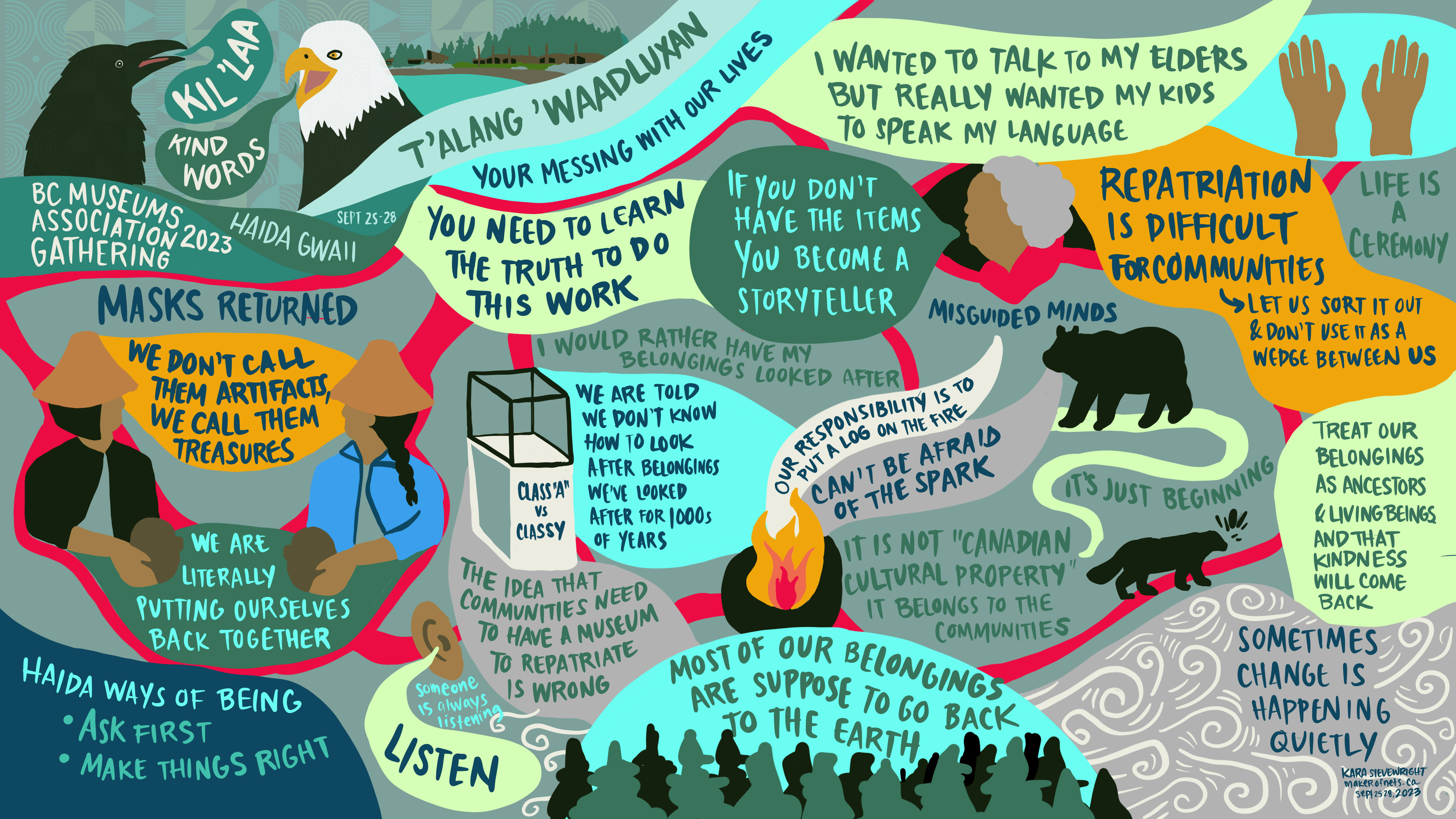BCMA Gathering 2023
Digital Dialogues Series
Virtual | July – December, 2023
Introducing the Digital Dialogues Series – Reflecting Critically on the Impact of Technology in the Arts, Culture, and Heritage Sector
Museums are not neutral, and neither are the digital tools we use in our work. Despite nearly all arts, culture, and heritage professionals/volunteers using digital tools in their roles, the broader impacts of these seemingly essential parts of our practice are rarely examined critically. Digital Dialogues is a series of online and in-person discussions in and around our 2023 gathering in Haida Gwaii that seeks to explore the cultural, social, environmental, and political impacts of the emerging and ubiquitous tools we use daily in the arts, culture, and heritage sector.
Digital tools can amplify harm, reinforce colonial systems of oppression, and impact the environment. This series will bring experts, innovators, and critical thinkers together to discuss the societal effects of technology to equip the sector with the tools to make ethical equity-informed steps toward digital innovation.
The BCMA gratefully acknowledges funding support of this series from the Canada Council for the Arts, Digital Greenhouse.

This series is also sponsored by:
How to Participate
The Digital Dialogues series is open to anyone registered to attend the 2023 Haida Gwaii gathering either virtually or in person. Virtual tickets are still available here.
Digital Access | Gathering Registration
Includes select session recordings and full access to the Digital Dialogues Series

Schedule
Please note: Dates, times, and sessions are subject to change. Registration for individual sessions will open on an ongoing basis.
July
Resource | Digital Dialogues Reading List
The BCMA is curating a selection of readings that critically examine the impacts of digital tools. New resources and categories will be added regularly from July to December 2023.
August
Podcast | Welcome to the Digital Dialogues
We live in a complicated world. And with the explosion of AI tools over the past year that promise to blur the line between the real and the imaginary, it isn’t looking like life will get any simpler in the foreseeable future.
Welcome to the Digital Dialogues discussion series. Over the next several months, the BC Museums Association will be joined by experts, innovators, and critical thinkers to discuss the societal effects of technology to equip the sector with the tools to make ethical equity-informed steps toward digital innovation.
In the rush to embrace new and seemingly innovative technologies, it can be easy to start using these tools in our work without first thinking about their broader social, environmental, and cultural impacts. The Digital Dialogues series is designed to complement the 2023 gathering on Haida Gwaii, to help make additional space for important discussions that can’t fit into the agenda and to help continue dialogues sparked at the event.
Resource | An introduction to Blockchain/Cryptocurrency/NFTs (Updated for 2023)
An introduction to Blockchain, Cryptocurrency, and NFTs
An introduction to Blockchain/Cryptocurrency/NFTs. The world of the blockchain (a technology that is currently being rebranded as “Web3”) is complex, obtuse, and often seems to defy conventional logic. If you feel mystified by technologies like Bitcoin or NFTs that’s perfectly normal - the blockchain is obtuse by design.
September
Session | T’alang ‘waadluxan – You’re Messing With Our Lives
A discussion of the human impact of museums – This session will focus on how the work of museums and cultural institutions is felt by communities and individuals. It will serve as a reminder that our collective work, while often based in things that happened in the past, is very relevant and sometimes harmful in the present. Hear from Indigenous representatives from across BC about their take before engaging in a discussion as a group.
With Jisgang Nika Collison, Haida Gwaii Museum, Juanita Johnston, U’mista Cultural Centre, c̓ris Jordan Coble, Westbank First Nation, and Yahlnaaw, Taajuu Consulting

T’alang ‘waadluxan – You’re Messing With Our Lives
Viewing is limited to 2023 Gathering delegates and BCMA members who purchased Digital Gathering tickets. This session will be shared publicly online in summer 2024.
Session | Transformational Digital Landscapes for Community Spaces
The Musqueam First Nation partnered with the Beaty Biodiversity Museum to explore the complex web of knowledge around the making and use of a sturgeon harpoon. What emerged was a digital museum experience which immersed viewers in a space where Indigenous knowledge and scientific classification met in dialogue. This asset is now being adapted in the daycare space at Musqueam for a younger age group with community-specific knowledge in a non-public deployment. What is the potential for an exhibit developed by the community for the community? How can the outcome be a living resource for Musqueam that provides long-term benefits? Join Derek Tan & Evan Craig to learn more!
Transformational Digital Landscapes for Community Spaces
Viewing is limited to 2023 Gathering delegates and BCMA members who purchased Digital Gathering tickets. This session will be shared publicly online in summer 2024.
November
November 3, 2023
12:00 – 1:00 PM PT
Session | Digital archives: working in partnership to address tomorrow’s challenges today
Digital archives and the technologies that support them are ever-evolving. As archivists, special collections professionals, custodians and technology vendors, we have a shared responsibility and privilege to work together to ensure that the materials and stories we preserve and curate are discoverable and accessible, both today and for the generations that follow us.
In this Digital Dialogue, AM, the primary sources publisher behind the digital collections platform Quartex, welcomes museum professionals from Canada and the US to discuss these aims and how technology can support us in delivering them.
Join us for what promises to be a stimulating and thought-provoking discussion that is sure to include the latest ideas and practices in digitisation, building and maintaining accessible digital archives, AI-driven automated transcription services, data visualisations from digital exhibits to timelines, interoperable image viewers and more.
We look forward to welcoming you to our digital dialogue.
The Digital Dialogue Series is sponsored in part by AM Quartex
![]()
November 14
12:00 – 1:00 PM PT
Session | Resisting Artificial Intelligence Through Anti-Fascism and Indigenous Data Sovereignty
In the past year, we have seen a boom in hype around Artificial Intelligence, or AI. With so many billion-dollar companies promising a coming AI revolution that aims to improve our lives, it is difficult to discern hype from harm. In this session Dan Mcquillan, Lecturer in Creative and Social Computing at Goldsmiths, University of London and author of the recent book Resisting AI: An Anti-Fascist Approach to Artificial Intelligence, and Jeff Doctor, the Impact Strategist at Indigenous-owned and operated tech company Animikii, will dig into the hidden social, cultural, human, and environmental harms at the core of artificial intelligence.
As trusted sources of information, it is critical that museums, galleries, and cultural institutions stay abreast trends that impact the communities they serve. This session will help provide a deep, critical understanding of this widely misunderstood technology.
Resisting Artificial Intelligence Through Anti-Fascism and Indigenous Data Sovereignty
Viewing is limited to 2023 Gathering delegates and BCMA members who purchased Digital Gathering tickets. This session will be shared publicly online in summer 2024.
December 12
12:00 – 1:00 PM PT
Session | Community-Driven Considerations for Digitization Practices
Community-Driven Considerations for Digitization: What does community-driven digitization look like? Join researchers and heritage professionals who are working on community-driven and informed projects and learn about the benefits, limitations, and challenges associated with digitization in a community context. Explore how different communities respond to technologies like 3D scanning, 3D printing, and general digitization of cultural objects and belongings. Before you begin a new digitization project, you’ll want to reflect on the examples and themes discussed in this critical session.
This session is sponsored by Ingenium Canada’s Digital Innovation Lab

The BCMA is grateful to our sponsors

Community-Driven Considerations for 3D Scanning and 3D Printing is sponsored by Ingenium Canada.
The Digital Innovation Lab, located in the state-of-the-art Ingenium Centre, is a collaborative hub for exploring innovative ways to improve access to museums spaces, collections, and experiences for all Canadians. Working with academia, start-ups, visitor-serving industries, and the accessibility community, the Lab explores emerging technologies, user experience and accessible design to create more inclusive experiences for everyone.
The BCMA is grateful to our sponsors

Showcase your archival material with AM Quartex, our easy to use and quick to implement digital collections platform.
Developed by AM to present our own primary source collections, Quartex is a digital asset management (DAM) system that is enabling museums, including the Peabody Essex Museum, Cape Ann Museum and Shakespeare’s Globe, to powerfully showcase, share and celebrate their archival materials in intuitive and visually engaging ways.
Quartex harnesses cutting-edge technologies and dynamic content to maximise discovery, accessibility and engagement with your digitised materials. Join their webinar, part of our Digital Dialogue Series, to learn more!
For Museums | Learn More | Contact
See AM Quartex in action in this video featuring the Peabody Essex Museum.
Digital Dialogues Reading List
The BCMA is curating a selection of readings that critically examine the impacts of digital tools. New resources and categories will be added regularly from July to December 2023.
AI and Colonialism:
Artificial intelligence is creating a new colonial world order
The impact of AI is repeating patterns of colonial exploitation. From MIT Technology Review, “European colonialism, they say, was characterized by the violent capture of land, extraction of resources, and exploitation of people—for example, through slavery—for the economic enrichment of the conquering country. While it would diminish the depth of past traumas to say the AI industry is repeating this violence today, it is now using other, more insidious means to enrich the wealthy and powerful at the great expense of the poor.”
AI and Colonialism:
How the AI industry profits from catastrophe
On data-labelling: “The insatiable demand has created a need for a broad base of cheap labour to manually tag videos, sort photos, and transcribe audio. The market value of sourcing and coordinating that “ghost work,” as it was memorably dubbed by anthropologist Mary Gray and computational social scientist Siddharth Suri, is projected to reach $13.7 billion by 2030.”
“By mid-2018, an estimated 200,000 Venezuelans had registered for Hive Micro and Spare5, making up 75% of their respective workforces.”
“The windfalls come just often enough to make her average income tenable. But they’re also rare enough to keep her tethered to her computer. If a good task appears, there are only seconds to claim it, and she can’t afford to lose the opportunity. Once, while out on a walk, she missed a task that would have made her $100. Now she restricts her walks to weekends, having learned that clients usually post tasks during their working hours.”
“Annotators in North Africa, where the platform has expanded in the last two years, say the same: Scale has reduced their pay by more than a third in a matter of months and withheld or even taken away earnings, leaving some workers with negative pending payments (in other words, they owe Scale money), according to screenshots provided to MIT Technology Review.”
“After two hours of work, which included completing a tutorial and 20 tasks for a penny each, Andrea Paola Hernández, the Venezuela-based reporter on this article, earned 0.11 US dollars. Park says workers in Venezuela earn an average of a little more than 90 cents an hour.”
AI and Colonialism:
The gig workers fighting back against the algorithms
Interesting, but more focused broadly on how technology is being used to exploit labour and how workers are pushing back.
AI and Colonialism:
A new vision of artificial intelligence for the people
“Data sovereignty is thus the latest example of Indigenous resistance—against colonizers, against the nation-state, and now against big tech companies. “The nomenclature might be new, the context might be new, but it builds on a very old history,” Kukutai says.”
AI and Colonialism:
‘Technology is a reflection of society’: Quebec researchers study racism and colonialism within AI
In Gentelet’s opinion, “it participates in a recolonization because technology is a reflection of society.”
AI and Colonialism:
Artificial intelligence and consent: a feminist anti-colonial critique
The goal of this article is to expose how the functional role of digital consent has been enabling data extractivist practices for control and exclusion, another manifestation of colonialism embedded in cutting-edge digital technology.
AI and Arts, Culture, and Heritage
Molly Crabapple Has Posted an Open Letter by 1,000 Cultural Luminaries Urging Publishers to Restrict the Use of ‘Vampirical’ A.I.-Generated Images
[A.I.] creates only ersatz versions of illustrations having no actual insight, wit, or originality,” the open letter continues. “Generative A.I. art is vampirical, feasting on past generations of artwork even as it sucks the lifeblood from living artists. Over time, this will impoverish our visual culture.”
AI and Arts, Culture, and Heritage
Resisting AI: An Anti-fascist Approach to Artificial Intelligence
“Dan McQuillan calls for us to resist AI as we know it and restructure it by prioritising the common good over algorithmic optimisation. He sets out an anti-fascist approach to AI that replaces exclusions with caring, proposes people’s councils as a way to restructure AI through mutual aid and outlines new mechanisms that would adapt to changing times by supporting collective freedom.”
AI and Arts, Culture, and Heritage
Museums and Technology – a Gentle Provocation
Presented at ICOM Prague. August 24, 2022.
AI and Arts, Culture, and Heritage
Museums and AI: Is There a Ghost in the Machine?
“Labor challenges aren’t the only systemic social problems replicated within AI. Biases like racism are inherent to everything people produce, which includes technology. As Mattu said, “Bias isn’t a bug; it’s a feature.” Without careful thought, the racism of society will remain inherent to all cultural products. The most classic example of racism in AI is when machine vision is used to make assessments about humans. Machines replicate the same poor judgments about people of color as humans because the algorithms are built without scrutinizing the engineer’s inherent biases. This example of bias is particularly salient for museum professionals if they plan to use machine vision to analyze images. The same faults that might cause problems with machine vision for photographs of people of color can create problems when analyzing images with people of color.”
3D Scanning & Printing
Rethinking Who ‘Keeps’ Heritage: 3D Technology, Repatriation and Copyright
“But what happens when a tangible work is repatriated but the scans remain behind? It is usually assumed that the digitising institution will keep digital copies. One example is the Killer Whale Hat digitised by the Smithsonian. Five years after the original was repatriated, Tlingit clan members participated in a digitisation project at the Smithsonian and they controlled how it was 3D scanned (such as removing the accidental damages from the replica), how the scans were later shared (not appearing online without permission) and how the replica would always be displayed with a disclaimer. This is a positive example, where the institution does not hold the original object, but also treats the 3D copies carefully and in line with the community’s needs.”
3D Scanning & Printing
Replication Ramification: Ethics for 3D Technology in Anthropology Collections
“As museums incorporate 3D technology within their institutions, ethical considerations must be addressed concerning human remains. Is it ethical to replicate nonconsensual human material in collections if they are ancient? What are the ramifications of further objectifying a decedent?”
Web3
Decentralized Woo Hoo
“If we venture down the technology arguments, at this point the discussion of intrinsic value of crypto assets reduces down to a rhetorical word salad of decentralized woo making all manner of appeals to alleged ideals of decentralization and networks”
Web3
Why NFTs Aren’t the Solution to Museums’ Deaccessioning Dilemmas or Any Other Big Problems, Either (and Other Insights)
This columnist explores the prospect of major U.S. museums fundraising by issuing NFTs of world-renowned works—and why it’s a distraction.
Social Media
Facebook’s ethical failures are not accidental; they are part of the business model
“Facebook’s failure to check political extremism, willful disinformation, and conspiracy theory has been well-publicized, especially as these unseemly elements have penetrated mainstream politics and manifested as deadly, real-world violence.”
Social Media
The indisputable harm caused by Facebook
“Facebook and the other apps it owns, including WhatsApp and Instagram, are now increasingly seen through the prism of the harm they appear to cause. They have become major platforms for misinformation, polarization and hate speech. At the same time, Zuckerberg and his colleagues rake in billions of dollars each quarter in profits. The company also keeps growing its user base, which now encompasses nearly half of humanity.”
Climate Action
‘It’s Now Or Never’: We Have 3 Years to Reverse Course, Major Climate Report Finds
Climate Action
Is AI good or bad for the climate? It’s complicated
“The choices that we make implicitly as technologists can matter a lot,” said Prof. Rolnick. “Ultimately, AI for Good shouldn’t just be about adding beneficial applications on top of business as usual, it should be about shaping all the applications of AI to achieve the impact we want to see.”
Tech and Society
Jack and the Cloud Giant
“In this story, we follow a young peasant called Jack up a data-vine that leads into the Cloud Giant’s techno-castle, where he finds out what happens when he plugs his farm into the glittering apps and the dazzling promises of precision agriculture.”
Tech and Society
How Tech is Remaking the Food System
“Truthfully, what we actually have is not one food system, we have two food systems; we have the ways in which people have always fed themselves, which is particularly small farmers, peasants, small producers, producing food on the land, sharing it within their territories, and so forth, these kinds of webs of provision. And now for 100 years, we’ve had the growth of what’s called the industrial food chain. That food chain model, which extracts value, extracts calories from the soil, extracts labor from people, and destroys as it goes, is now way beyond breaking point. It’s harming not just the environment and our health, but people’s ability to live in justice. So, we have a system that is not just breaking under its own weight, it is breaking people, the land, the environment and our democracy. It’s a pretty grim picture.”
Tech and Society
#DataBack | Recognize and Reclaim Indigenous Data Sovereignty
“Indigenous Data Sovereignty can be defined as the right of a nation to govern the collection, ownership, and application of its own data. As Ray Taken Alive says in a quote from his Twitter account: “No matter how it was collected, where it was collected, when it was collected, our language belongs to us. Our stories belong to us. Our songs belong to us.”
Productivity Tools
Google’s updated privacy policy doubles down on using your data for training AI
AI is a bigger focus for Google than it ever has been, and in an update to its privacy policy, Google is doubling down on its ability to use data for training AI models.

